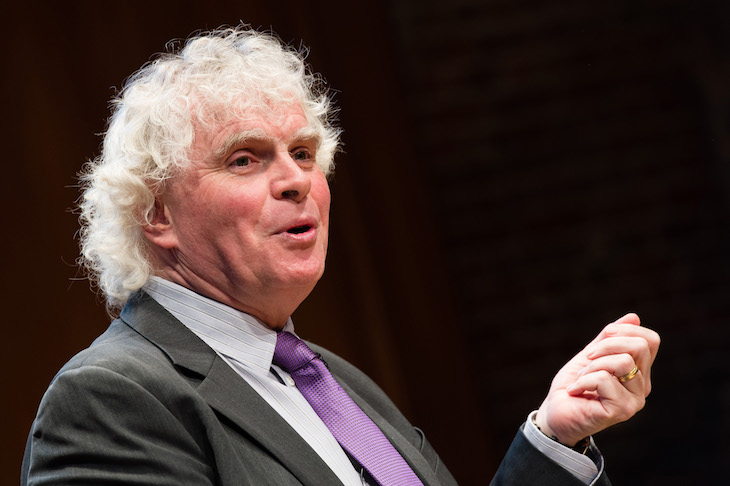‘Rarely, rarely, comest thou, Spirit of Delight!’ wrote Elgar, quoting Shelley, at the top of his Second Symphony. He should have listened to more Haydn. Sir Simon Rattle certainly has. Rattle becomes music director of the London Symphony Orchestra in September, and for the last concert before their union becomes official, he’d trawled through Haydn’s immense back-catalogue to assemble an unbroken 55-minute sequence of orchestral movements from Haydn’s symphonies, oratorios and half-forgotten operas. ‘This is an adventure,’ he declared, in that slightly goofy way that gets audiences instantly onside even while it infuriates those who, after four decades of achievement unsurpassed by any British conductor ever, still fail to understand what Rattle does and why he matters.
At this point I was planning to take a swipe at the Rattle-bashers — the tedious collection of cynics, snobs and the professionally underwhelmed who are already preparing to spatter cold, stale water on Rattle’s plans for London. But Haydn makes that impossible. He’s just too life-affirming. Anyone who’s discovered him knows that Haydn offers delights — emotional, intellectual, fantastical — of such freshness and generosity that his music should really be classified as a mood-altering substance. ‘No other composer, to my mind, has a greater capacity to dispel irritation or lift a mood of depression,’ wrote the psychiatrist Anthony Storr. ‘There is an objectivity about his music which shames self-absorption.’
Rattle’s ‘imaginary orchestral journey’ was an attempt, in equal parts reverent and gleeful, to make exactly that point. The aim, he said, was to showcase Haydn at his ‘most original, most bizarre, most witty’, and while some of these pieces were familiar — like the ‘Chaos’ prelude to The Creation, played with a rapt, vibrato-free intensity that could have been mistaken for a period-instrument ensemble — others, like the Adagio from Symphony No. 64 came as a discovery even to this lifelong Haydnista. Rattle found its eccentricity as well as its grace: bringing up the violas to warm phrases from within and coaxing a fierce sweetness from the dissonant oboes that precipitate the movement’s central crisis.
Elsewhere, he simply let his players fly. The LSO’s leader Gordan Nikolitch practically bounced out of his seat, while in the Minuet from the ‘Le Matin’ symphony, a single impeccably placed bassoon note (the last) turned the whole central Trio section into an epigram. At last, after the final players vacated the stage in a reimagining of the premiere of the ‘Farewell’ symphony, Rattle was left alone in darkness. Through antiphonal loudspeakers the oddly poignant little melodies that Haydn wrote for mechanical flute-clocks at the palace of Eszterhaza warbled and clashed before resolving into C major. Whereupon the lights went up, the musicians returned, and Rattle plunged headlong into the finale of Symphony No. 90.
Gimmicky? Inauthentic? None of the 12 symphonies that Haydn wrote for London in the 1790s was played uninterrupted at its premiere. And the wackiest gags in this concert — the farcical re-tuning in the finale of Symphony No. 60, and the dummy endings which tricked the Barbican audience into premature applause not once, but twice, in No. 90 — were actually written into the music by Haydn who, like Rattle, knew a thing or two about connecting with his public. If Haydn’s symphonies aren’t receiving their due in a culture that’s got used to epic blowouts by Mahler and Strauss, who’s to say that repackaging them into hour-long sequences isn’t exactly what he’d have done? I left this concert grinning like an idiot.
A few nights later at the Proms, Daniel Barenboim conducted the Staatskapelle Berlin in Sir Harrison Birtwistle’s ‘Deep Time’. Cue the familiar Birtwistle landmarks: black, peaty grunts from basses and tubas, splintering piano and percussion, and jagged brass eruptions that rear through the music’s crust like outcrops of millstone grit. Birtwistle apparently conceived it as the belated final part of a trilogy with The Triumph of Time (1972) and Earth Dances (1986), but in this superbly played UK première I didn’t sense quite the same ruthless momentum that drives those works. The soul of the piece seemed to lie, rather, in what came after each climax — keening oboe and sax melodies, and passages of quiet disintegration. Perhaps the old Minotaur is finally mellowing.
It was dwarfed by Elgar’s Second Symphony, played with heroic sweep and heart-melting beauty. The cult around Barenboim can be off-putting, but the tenderness and understanding with which he probed Elgar’s most troubling secrets, combined with the radiance of the orchestral sound, made this one of those great Proms occasions that you hear about more often than you actually experience. Barenboim then killed the mood with a rambling sermon from the podium whose content overshadowed (on social media at least) any discussion of the altogether more complex things that he’d so eloquently helped Birtwistle and Elgar to say. Rattle at least knows when to let the music do the talking.






Comments